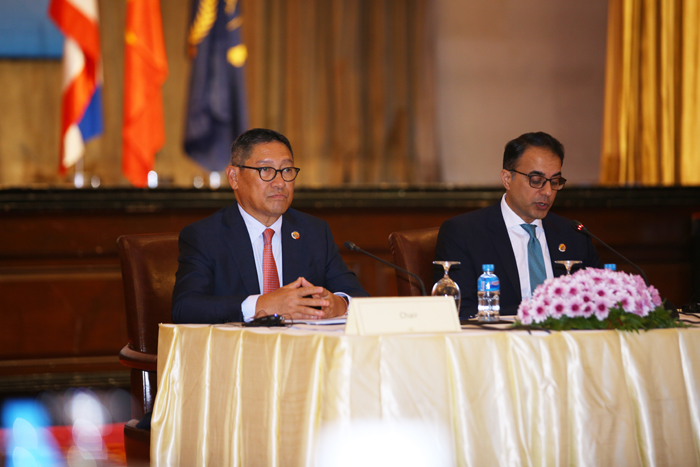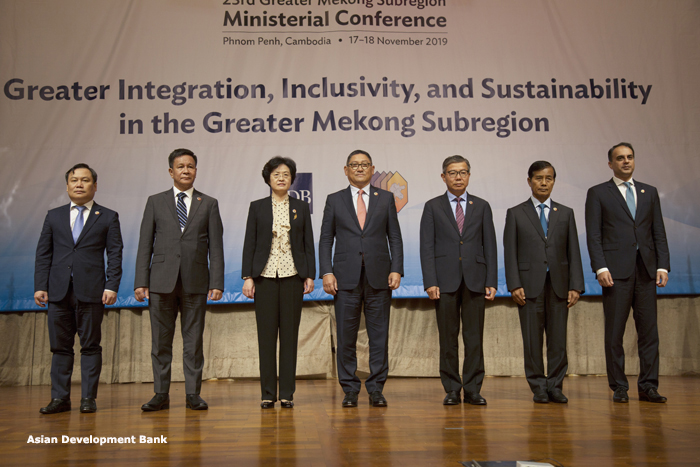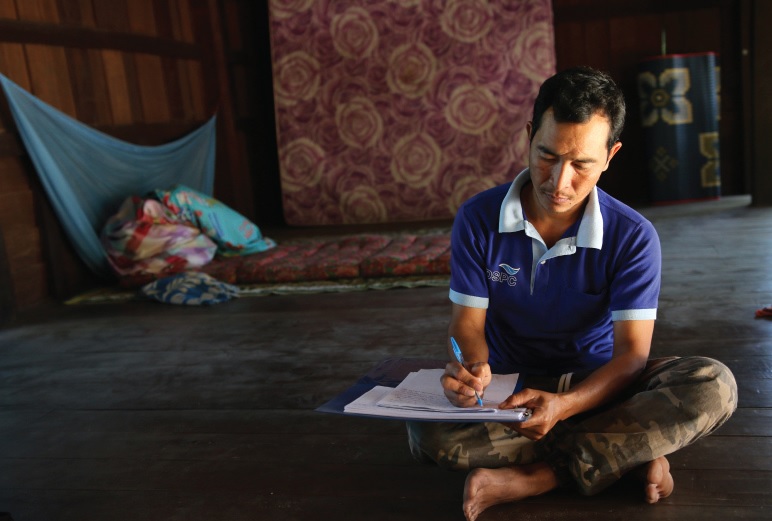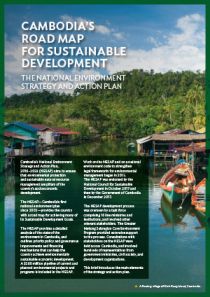Joint Statement from 23rd GMS Ministerial Conference
This is the joint statement issued at the 23rd GMS Ministerial Conference held in Phnom Penh, Cambodia on 18 November 2019.
In the Greater Mekong Subregion, 200 million people in rural areas depend on their surrounding environment for food, water, energy, and income. Forests, wetlands, mangroves, farmlands, and other ecosystems account for between 20% and 55% of the subregion's wealth.
The Working Group on Environment (WGE) provides overall leadership and direction for the subregion's Core Environment Program.
Natural ecosystems – and the food, water, energy, and other vital elements they provide – lie at the heart of the development of the Greater Mekong Subregion. How these natural resources are protected, managed, and enhanced will determine the long-term sustainability of its environment and economic development.
Overexploitation of natural resources, pollution, vulnerability to climate change, and ever-increasing natural disasters are threatening these ecosystems. In addition, environmental degradation is posing risks to sustained long-term growth, and could cost a whopping $55 billion in foregone services over the next 25 years if left unchecked.
Unless there is better planning and management, the subregion’s resource-intensive development approach could lead to food shortages, price shocks, health hazards, and environmental damage that impact thousands of families and put businesses at risk.
The GMS Economic Cooperation Program Strategic Framework 2030 (GMS-2030) will focus on improving environmental sustainability and climate change resilience in the subregion. Environment and climate change challenges will be addressed through green technologies; protection of ecosystems and key ecological processes; climate resilience policies; and disaster-risk management, all of which will recognize the essential role that communities play as stewards of natural resources. A systematic effort will be made to mainstream climate change considerations into all GMS interventions, with a focus on energy efficiency, renewable energy, climate-smart landscapes, and sustainable waste management, particularly in terms of healthy ocean and river systems, and the tackling of plastic pollution. GMS-2030 was endorsed and adopted at the 7th GMS Summit of Leaders in September 2021. It aims to provide a new setting for the development of this subregion for the next decade.
The Core Environment Program Strategic Framework and Action Plan 2018-2022 was endorsed by GMS ministers at the 5th GMS Environment Ministers' Meeting in Chiang Mai, Thailand, held on 30 January – 1 February 2018. The 5-year environment strategy focuses on green technologies and sustainable infrastructure, natural resources and ecosystem services, and climate resilience and disaster risk management.
The GMS Climate Change and Environmental Sustainability Program (GMS CCESP), the third and current phase of the GMS Core Environment Program, supports environmental cooperation and green investments in the GMS. It covers six priority themes that were identified during the 24th Annual Meeting of the GMS WGE in 2019: (a) building climate and disaster resilience; (b) facilitating low carbon transitions; (c) promoting climate-smart landscapes; (d) enhancing environmental quality through pollution control and sustainable waste management; (e) deploying digital technologies for climate actions and environmental sustainability; and (f) financing low-carbon and climate-resilient infrastructure and technologies, including demonstrating climate and disaster risk financing instruments. The GMS CCESP builds on the achievements and lessons from the first two phases of the GMS Core Environment Program, and runs until 2025.
The GMS Core Environment Program was designed to help countries in the GMS meet the increasing demand for food, energy, water, and other natural resources, while at the same time ensuring that resources are available for future generations. This included balancing rapid growth with sustainable practices, and protecting vital water resources, controlling floods, preserving biodiversity and critical ecosystems, and mitigating the impacts of urban expansion.
Related
• GMS Core Environment Program website
• Greater Mekong Subregion Climate Change and Environmental Sustainability Program (Brochure)
Contact Persons
Focal Persons at the Asian Development Bank
Srinivasan Ancha
Climate Change, Resilience, and Environment Cluster
Climate Change and Sustainable Development Department
Mark Bezuijen
Agriculture, Food, Nature, and Rural Development Sector Office
Sectors Group
Other Concerned Staff & Consultants
Alvin Lopez
Agriculture, Food, Nature, and Rural Development Sector Office
Sectors Group
Criselda Rufino
Agriculture, Food, Nature, and Rural Development Sector Office
Sectors Group
Asadullah Sumbal
Regional Cooperation and Integration Unit
Southeast Asia Department
Rafaelita Jamon
Regional Cooperation and Integration Unit
Southeast Asia Department/GMS Secretariat
Send inquiries to GMS SAFSP Secretariat and GMS Secretariat.
This is the joint statement issued at the 23rd GMS Ministerial Conference held in Phnom Penh, Cambodia on 18 November 2019.

Seated from left: Mr. Sok Chenda Sophea, Minister attached to the Prime Minister, Minister in charge of GMS Cooperation Program/GMS Minister, Secretary General, Council for the Development of Cambodia, and Mr. Ahmed M. Saeed, Vice President for ADB Operations in the Southeast Asia Department, the East Asia Department, and the Pacific Department at the 23rd GMS Ministerial Conference. Photo by ADB.
The Asian Development Bank (ADB) remains committed to supporting the future initiatives of the Greater Mekong Subregion (GMS) Program. Mr. Ahmed M. Saeed, Vice President of ADB, reaffirmed ADB’s support in his speech at the recently-concluded 23rd GMS Ministerial Conference (MC-23). The MC-23 was Mr.

Heads of GMS country delegations participate in the 23rd GMS Ministerial Conference. Standing from left are Mr. Vu Dai Thang, Deputy Minister, Ministry of Planning and Investment, Viet Nam; Mr. Aung Htoo, Deputy Minister, Ministry of Commerce, Myanmar; Ms. Cheng Lihua, Vice Minister, Ministry of Finance, PRC; Mr. Sok Chenda Sophea, Minister attached to the Prime Minister, Minister in charge of GMS Cooperation Program/GMS Minister, Secretary General, Council for the Development of Cambodia; Mr. Viengsavath Siphandone, Deputy Minister, Ministry of Public Works and Transport, Lao PDR; Mr. Thaworn Senneam, Deputy Minister, Ministry of Transport, Thailand; and Mr. Ahmed M. Saeed, Vice President for ADB Operations in the Southeast Asia Department, the East Asia Department, and the Pacific Department. Photo by ADB.
The Royal Government of Cambodia and the Asian Development Bank (ADB) organized the 23rd GMS Ministerial Conference on 17-18 November 2019 in Phnom Penh, Cambodia, with the theme “Greater Integration, Inclusivity and Sustainability in the GMS.” The meeting brought together GMS Ministers and Senior Officials of the six GMS countries—Cambodia, the People’s Republic of China (PRC), Lao People’s Democrati

Phnom Penh skyline reflecting the city's rapid growth. The Central Market, built in 1937, is seen in the foreground. Photo by Lor Teng Huy - own work, CC BY-SA 4.0
The Ministers of the six member countries of the Greater Mekong Subregion (GMS) are set to lay the groundwork for the preparation for the 7th GMS Summit of Leaders.
Hosted by the Royal Government of Cambodia and the Asian Development Bank (ADB), the 23rd GMS Ministerial Conference (MC-23) will take place in Phnom Penh on 18 November 2019, with the theme "Greater Integration, Inclusivity and Sustainability in the GMS.”

Khamking Koemany is a homestay provider on Don Khon Island, one of the popular sites for tourists visiting the Four Thousand Islands group on the Mekong River in Champasack Province. His business has flourished since he received training in tourism services under the GMS Sustainable Tourism Development Project. Photo: ADB.
Blessed with rich natural resources and a strategic location at the heart of the Greater Mekong Subregion, the Lao People’s Democratic Republic has emerged from decades of turmoil and isolation to become one of the fastest growing economies in Southeast Asia since 2011.

Cambodia’s national environment plan provides the country with a road map for achieving many of its Sustainable Development Goals.
The People's Republic of China is shifting freight transport from roads to railways and waterways, and improving urban logistics systems to reduce carbon emissions.
This is the summary of proceedings from the 23rd Annual Meeting of the Greater Mekong Subregion Working Group on Environment (WGE AM-23) held in Siem Reap, Cambodia on 12 July 2017.